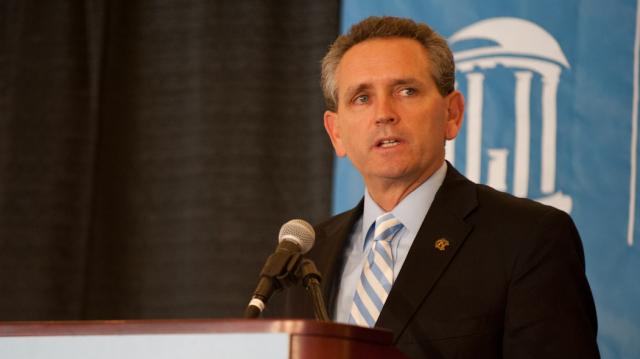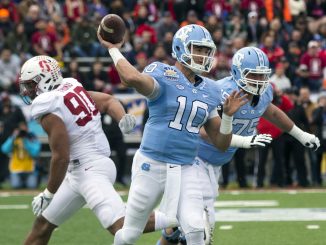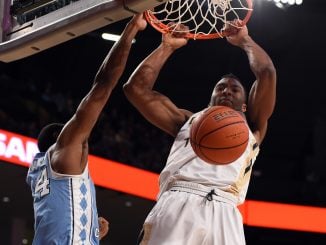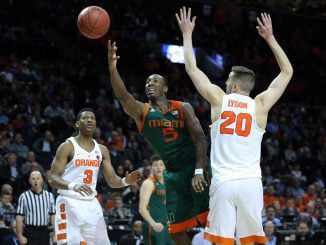
The ongoing dispute between North Carolina and the NCAA has taken more twists and turns than a mountain road since the case involving suspect classes in the school’s African and Afro-American Studies department began in 2011.
The one constant has been UNC’s assertion that the scandal is an academic issue outside the NCAA’s jurisdiction.
That claim was hammered home again by UNC in its third and latest response to an NCAA Notice of Allegations, which was released to the public on Thursday.
“The fundamental issue in our case is that the NCAA bylaws cover athletic matters, not how academics are managed,” athletic director Bubba Cunningham said on a teleconference with the media. “We have thoroughly addressed academic oversight with our accrediting agency, which is the proper governing body for academic issues.
“Our reply to each allegation is based on the NCAA’s constitution and member-adopted bylaws. We expect the Committee on Infractions to consistently apply these bylaws as the case moves forward.”
The latest phase of the case has dragged on for more than three years and has included three separate notices spelling out five Level I NCAA violations. The most recent was received by UNC in December. It reinstated mention of the Tar Heels’ men’s basketball and football programs that were omitted from the previously amended version.It also reclassified the anomalous AFAM courses referred to in Allegation 1 as “impermissible extra benefits” while using harsher language in describing the violation as “unethical conduct” and accusing UNC of the more serious “lack of institutional control.”
But UNC fired back with a 102-page document that cites five factors to support its contention that AFAM irregularities should not be considered a breach of NCAA rules.
Those factors, as spelled out in the school’s response, are that the courses were available to all students; that athletes were treated no differently than the other students enrolled in the courses; that the courses originated in the AFAM department as a means to “assist students with a wide variety of challenges and interests;” that no coach or athletic department employee were involved in steering athletes to the courses; and that the issues involved with the courses were academic in nature and not “the result of inadequate athletic oversight.”
It was also pointed out that UNC has already been sanctioned by its accrediting agency, the Southern Association of Colleges and Schools, and has instituted some 70 reforms and initiatives to prevent the issues from happening again.”
The allegations have changed a couple of times, so this response is specific to this set of allegations,” Cunningham said. “But I would say that in a global sense, it’s consistent with what our position has been from the very beginning.”
There are a few differences in this latest response.The most significant is UNC’s claim that athletes comprised only 27.4 percent of the enrollment in the suspect AFAM classes. That figure is much lower than the 47 percent described in the report issued by former federal prosecutor Kenneth Wainstein.
Cunningham declined to elaborate on how the new figure was reached, but implied that it had more to do with semantics than mathematics.
“The definition of a student-athlete is defined by the NCAA for our purpose and in other reviews and investigations, how you define that is a little bit different,” Cunningham said. “That’s probably as much as I should weigh in on a specific relative to one of our responses.”In addition to the adjusted percentage, UNC’s latest response to the NCAA includes new testimony from former AFAM administrator Deborah Crowder — a key figure prominently named in the allegations who was interviewed by the NCAA in March.
It also, for the first time, cites as precedent two previous cases in which the NCAA declined to sanction neither Michigan nor Auburn for similar academic issues.
“In my experience, each case is different,” Cunningham said. “What we’re hoping is the facts of this case are measured consistently with the bylaws and definitions that have been adopted by the (NCAA) membership.”While Cunningham said that UNC is “prepared to work through all of the (NCAA) processes” until the seemingly never-ending case is decided, he and other university officials — including chancellor Carol Folt — have expressed concern over the fairness of that process.
Specifically, their issue is with a potential conflict of interest involving SEC commissioner and Committee on Infractions chairman Greg Sankey. UNC has requested that Sankey recuse himself from its case, but he has declined.
Cunningham did not specify when UNC would be scheduled to appear before Sankey’s committee.
He did, however, say that he hopes the case will be decided on its merits and not — as UNC’s response spelled out — “media reports, commentary from various sources (including Mark Emmert, the President of the NCAA) and the investigative reports that reviewed these matters from perspectives unrelated to whether there have been NCAA rules violations.”
“The public narrative for the last six years, popularized by media accounts, is that the Department of Athletics at the University of North Carolina at Chapel Hill took advantage of ‘fake classes’ in the Department of African and African-American Studies to keep student-athletes eligible,” the response noted. “That narrative is wrong and contradicted by the facts in the record.”



